Heartburn
Heartburn medicine offers relief from the burn of acid reflux, which causes that familiar discomfort in the chest and throat. These treatments range from quick-acting antacids that neutralise excess stomach acid to longer-term solutions targeting acid production. Effective management of heartburn enhances comfort and may prevent the progression to gastroesophageal reflux disease (GERD). Read More…

-
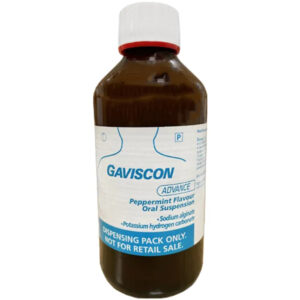
Gaviscon Advance Peppermint Suspension – 500ml
- Heartburn and indigestion
- Reduces acid reflux symptoms
- Active ingredients: Sodium alginate & potassium hydrogen carbonate
-
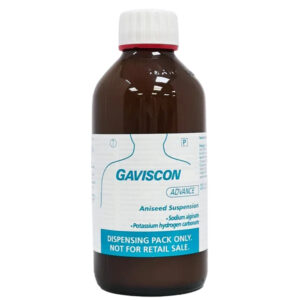
Gaviscon Advance Aniseed Suspension – 500ml
- Heartburn and indigestion
- Reduces acid reflux symptoms
- Active ingredients: Sodium alginate & potassium hydrogen carbonate
-
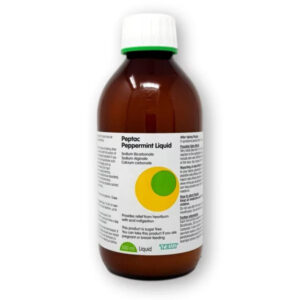
Peptac Peppermint Liquid – 500ml
- Reflux suppressant
- Provides relief from acid regurgitation, heartburn and indigestion
- Contains sodium bicarbonate, sodium alginate, calcium carbonate
-
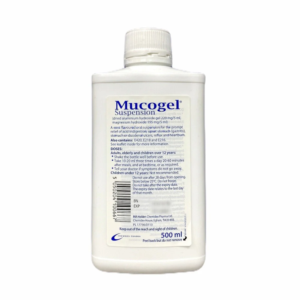
Mucogel Suspension Liquid – 500ml
- Suitable for children aged 12 years and over
- Effective treatment for heartburn and indigestion
- Active ingredient: Magnesium Hydroxide
-
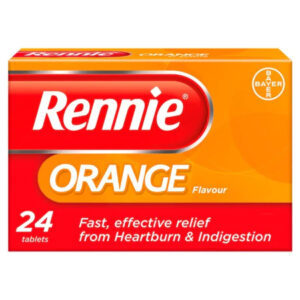
Rennie Orange Flavour – 24 Chewable Tablets
- For heartburn and indigestion
- Fast and effective relief
- Contains calcium carbonate
-
Sale!
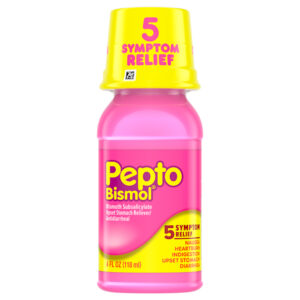
Pepto Bismol Liquid
- Protective coating action
- Fast relief of heartburn, indigestion, nausea & upset stomach
- Active ingredient: Bismuth subsalicylate
£4.79 – £14.39 Select options This product has multiple variants. The options may be chosen on the product page -
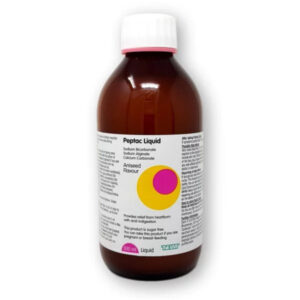
Peptac Aniseed Liquid – 500ml
- Reflux suppressant
- Provides relief from acid regurgitation, heartburn and indigestion
- Contains sodium bicarbonate, sodium alginate, calcium carbonate
-
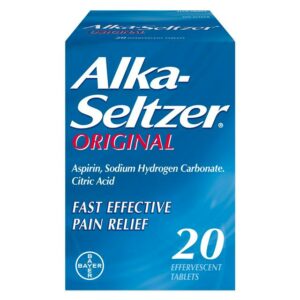
Alka-Seltzer Original – 20 Tablets
- Fast & Effective Relief From Upset Stomach
- Buy With Confidence From UK Registered Pharmacy
- Next Day Delivery Available
-
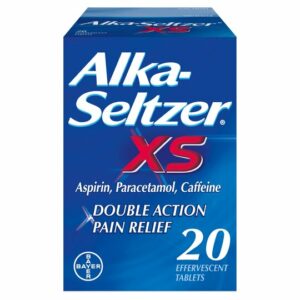
Alka-Seltzer XS Tablets – 20 Tablets
- Symptomatic Relief Of Colds And Influenza
- Effective reduction Of High Temperature
- Treats Mild To Moderate Pain In The Body
-
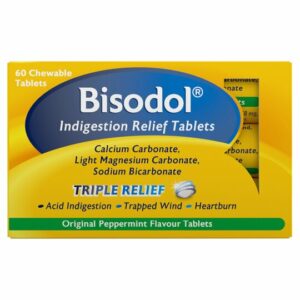
Bisodol Indigestion Relief Tablets
- Works Fast To Stop Heartburn
- Effective Relief From Trapped Wind
- Active Ingredient: Sodium Bicarbonate
£4.49 – £5.99 Select options This product has multiple variants. The options may be chosen on the product page -
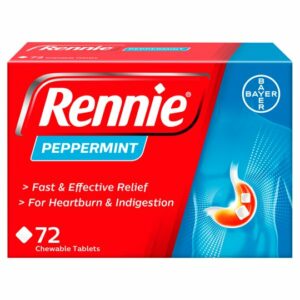
Rennie Peppermint – 72 Tablets
- For Indigestion and Heartburn
- Buy With Confidence From UK Registered Pharmacy
- Next Day Delivery Available
-
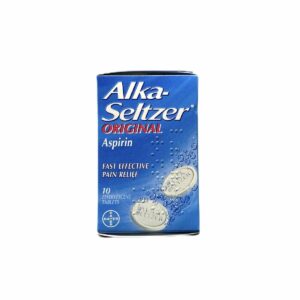
Alka-Seltzer Original – 10 Tablets
- Fast effective pain relief
- 10 effervescent tablets
- Main ingredient: Aspirin
-
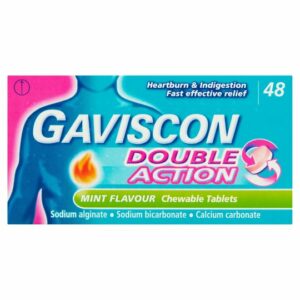
Gaviscon Double Action Chewable Tablets Mint – 48 Tablets
- Effectively treats heartburn and indigestion
- Relieves pain and discomfort
- Active Ingredient: Sodium Alginate
-
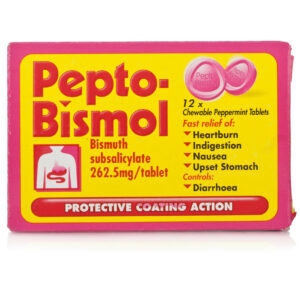
Pepto Bismol Tablets
- Protective coating action
- Fast relief of heartburn, indigestion, nausea & upset stomach
- Active ingredient: Bismuth subsalicylate
£5.99 – £8.99 Select options This product has multiple variants. The options may be chosen on the product page -
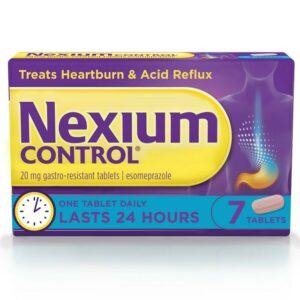
Nexium Control 20mg Gastro-Resistant Tablets – 7 Tablets
- Lasts Up To 24 Hours
- Effective Treatment of Heartburn and Indigestion
- Active Ingredient: Esomeprazole
-
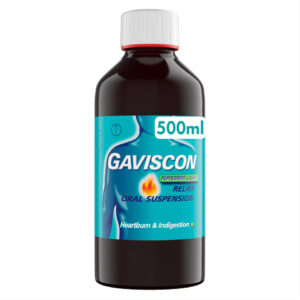
Gaviscon Original Peppermint 500ml
- Active Ingredients: Sodium alginate, sodium bicarbonate and calcium carbonate
- Used To Treat Symptoms Of Heartburn And Acid Indigestion
- Buy With Confidence From UK Registered Pharmacy
-
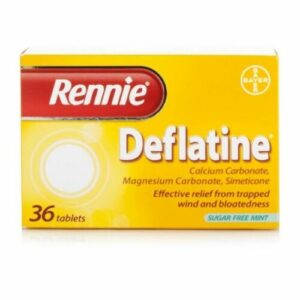
Rennie Deflatine Tablets
- Formulated With Simeticone
- Effective Treatment For Trapped Wind
- Buy With Confidence From UK Registered Pharmacy
£6.99 – £10.99 Select options This product has multiple variants. The options may be chosen on the product page -
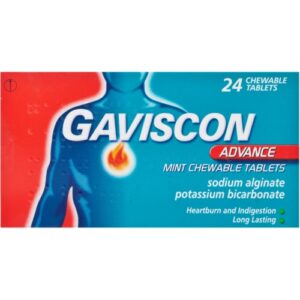
Gaviscon Advance Mint Chewable Tablets – 24 Tablets
- Effectively treats heartburn and indigestion
- Active ingredients: Sodium alginate & Potassium bicarbonate
- Long lasting relief
-
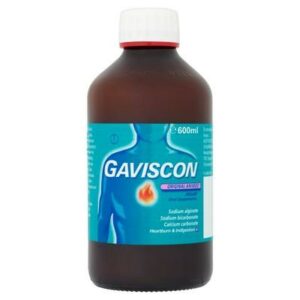
Gaviscon Original Aniseed 600ml
- Active Ingredients: Sodium alginate, sodium bicarbonate and calcium carbonate
- Used To Treat Symptoms Of Heartburn And Acid Indigestion
- Buy With Confidence From UK Registered Pharmacy
-
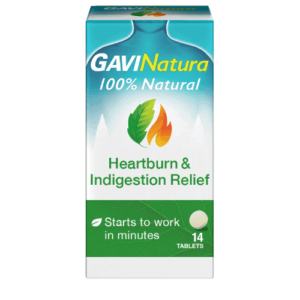
GAVINatura Heartburn & Indigestion Tablets – 14 Tablets
- GAVINatura effectively helps relieve heartburn and indigestion
- Starts to work in minutes
- 100% natural and gluten free
-
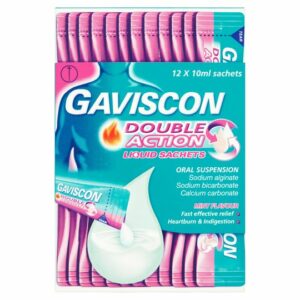
Gaviscon Double Action Liquid Sachets – 12 Sachets
- Works Fast To Stop Heartburn
- Easy To Take
- Active Ingredient: Sodium Alginate
-
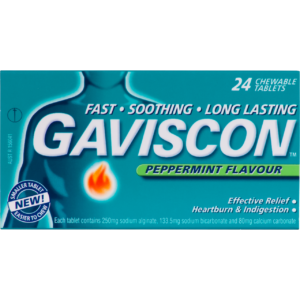
Gaviscon Peppermint Flavour Tablets
- Effective relief from heartburn and indigestion
- Peppermint flavour
- Fast, soothing and long lasting
£6.99 – £10.99 Select options This product has multiple variants. The options may be chosen on the product page -

Phillips Milk Of Magnesia Liquid 200ml – Mint Flavour
- Works Fast To Stop Heartburn
- Can Be Taken From Ages 3 And Up
- Active Ingredient: Magnesium Hydroxide
-
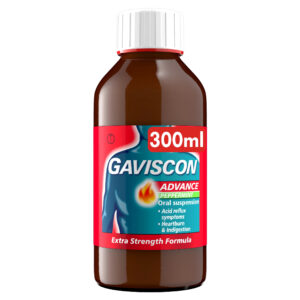
Gaviscon Advance Peppermint Suspension – 300ml
- Heartburn and indigestion
- Reduces acid reflux symptoms
- Active ingredients: Sodium alginate & potassium hydrogen carbonate
-
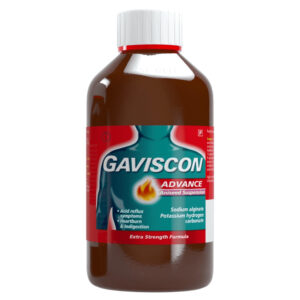
Gaviscon Advance Aniseed Suspension – 600ml
- Heartburn and indigestion
- Reduces acid reflux symptoms
- Active ingredients: Sodium alginate & potassium hydrogen carbonate
-
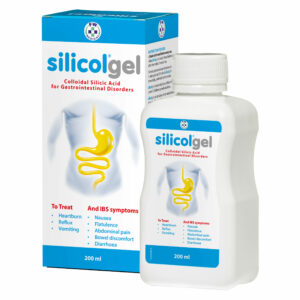
Silicol Gel – 200ml
- Reduces IBS Symptoms
- Removes Toxic Substances From The Stomach
- Effective Relief From Heartburn
-
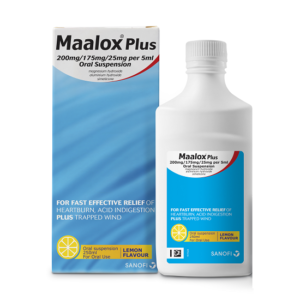
Maalox Plus Suspension 250ml
- Suitable For Children Aged 2 And Over
- Effective Treatment of Heartburn, Indigestion And Flatulence
- Active Ingredient: Magnesium Hydroxide
-
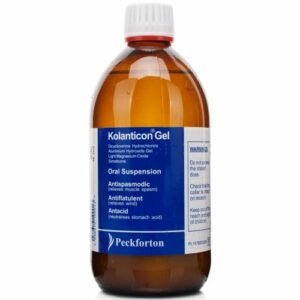
Kolanticon Gel Oral Suspension
- Relieves Muscle Spasms
- Targets Source Of Abdominal Pain
- Effective Relief From Cramps And Flatulence
£9.99 – £14.99 Select options This product has multiple variants. The options may be chosen on the product page -
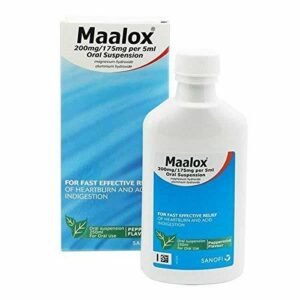
Maalox Suspension 250ml
- Suitable For Children Aged 2 And Over
- Effective Treatment of Heartburn, Indigestion And Flatulence
- Active Ingredient: Magnesium Hydroxide
-
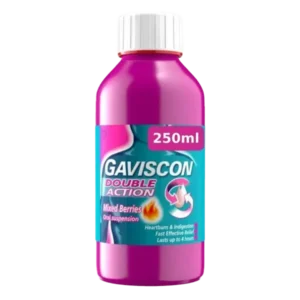
Gaviscon Double Action Liquid Mixed Berries – 250ml
- Provides fast dual relief from heartburn and indigestion
- Treats burning in chest, bloating and sour taste in the mouth symptoms
- Active ingredients: Sodium alginate, Sodium bicarbonate, Calcium carbonate
-
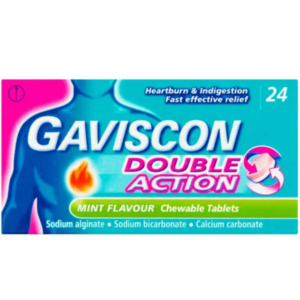
Gaviscon Double Action Chewable Tablets Mint – 24 Tablets
- Effectively treats heartburn and indigestion
- Relieves pain and discomfort
- Active Ingredient: Sodium Alginate
-
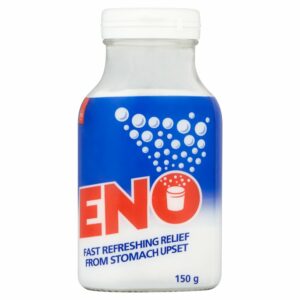
Eno Fruit Salts Original 150g
- Works Fast To Stop Heartburn
- Effective Relief From Nausea
- Active Ingredient: Sodium Bicarbonate
-
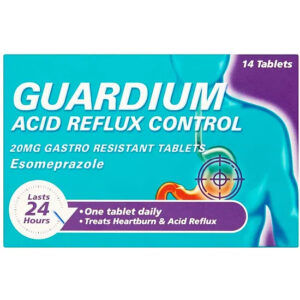
Gaviscon Guardium 20mg Tablets – 14 Tablets
- Works Fast To Stop Heartburn
- Lasts For 24 Hours
- Active Ingredient: Esomeprazole
-
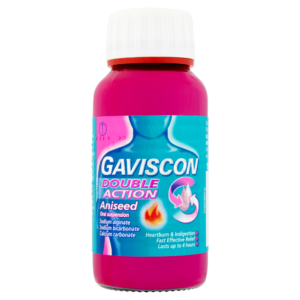
Gaviscon Double Action Liquid Aniseed – 300ml
- Provides fast dual relief from heartburn and indigestion
- Treats burning in chest, bloating and sour taste in the mouth symptoms
- Active ingredients: Sodium alginate, Sodium bicarbonate, Calcium carbonate
-
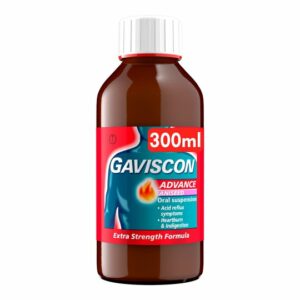
Gaviscon Advance Aniseed Suspension – 300ml
- Heartburn and indigestion
- Reduces acid reflux symptoms
- Active ingredients: Sodium alginate & potassium hydrogen carbonate
-
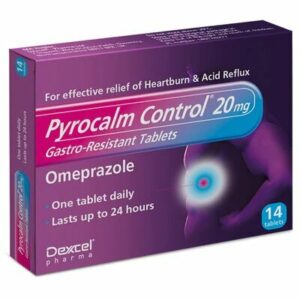
Pyrocalm Control Gastro-Resistant Tablets 20mg – 14 Tablets
- Lasts Up To 24 Hours
- Effective Treatment of Heartburn and Indigestion
- Active Ingredient: Omeprazole
-
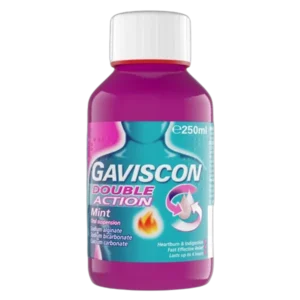
Gaviscon Double Action Liquid Peppermint – 250ml
- Provides fast dual relief from heartburn and indigestion
- Treats burning in chest, bloating and sour taste in the mouth symptoms
- Active ingredients: Sodium alginate, Sodium bicarbonate, Calcium carbonate
-
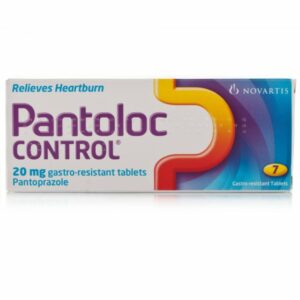
Pantoloc Control 20mg Gastro-Resistant Tablets – 7 Tablets
- Active Ingredient: Pantoprazole
- Provides Short Term Relief
- Effective Relief From Heartburn
-
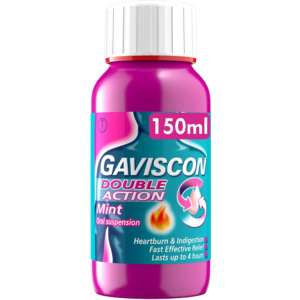
Gaviscon Double Action Liquid Peppermint – 150ml
- Provides fast dual relief from heartburn and indigestion
- Treats burning in chest, bloating and sour taste in the mouth symptoms
- Active ingredients: Sodium alginate, Sodium bicarbonate, Calcium carbonate
-
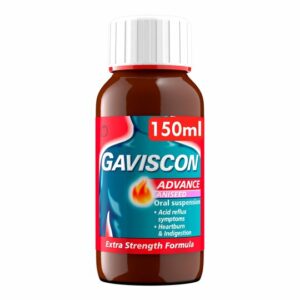
Gaviscon Advance Aniseed Suspension – 150ml
- Heartburn and indigestion
- Reduces acid reflux symptoms
- Active ingredients: Sodium alginate & potassium hydrogen carbonate
-
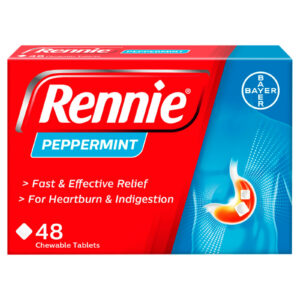
Rennie Peppermint – 48 Tablets
- For indigestion and heartburn
- Fast and effective relief
- 48 chewable tablets
-
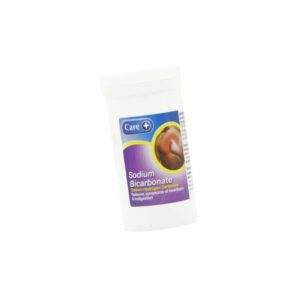
Care Sodium Bicarbonate 300g
- Provides Relief From Insect Bites And Sunburn
- Can Be Used Topically Or Orally
- Effective Relief From Heartburn
-
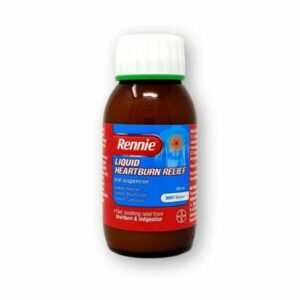
Rennie Liquid Mint Heartburn Relief 150ml
- Works Fast To Stop Heartburn
- Suitable For Children Over 6
- Active Ingredient: Sodium Bicarbonate
-

Gaviscon Double Action Liquid Aniseed – 150ml
- Provides fast dual relief from heartburn and indigestion
- Treats burning in chest, bloating and sour taste in the mouth symptoms
- Active ingredients: Sodium alginate, Sodium bicarbonate, Calcium carbonate
-
About Heartburn
Heartburn, a common symptom of acid reflux, causes a burning sensation in the chest and can escalate after meals or when lying down. It often responds well to lifestyle adjustments and over-the-counter medications. For persistent or severe cases, which may indicate gastroesophageal reflux disease (GERD), a doctor’s evaluation is recommended.
-
Symptoms
Heartburn is characterised by a burning sensation in the chest, often accompanied by an unpleasant taste in the mouth or throat. Symptoms typically arise after eating, during the evening, or when lying down or bending over, as these positions or times can exacerbate the backflow of stomach acid into the oesophagus.
Key symptoms include:
• A burning pain or discomfort that moves up from the stomach to the chest and may continue into the throat.
• A feeling that food is coming back into the mouth, leaving an acidic or bitter taste.
• A sensation of pressure or burning in the chest that can mimic the pain of heart disease, often leading to confusion between the two conditions.Heartburn is a common occurrence for many and does not usually indicate a serious health issue. However, recurrent or severe heartburn may signal gastroesophageal reflux disease (GERD), requiring medical attention.
-
Diagnosis
Diagnosing heartburn typically begins with a clinical assessment of your symptoms by a healthcare provider. If the heartburn is frequent or severe, indicating possible gastroesophageal reflux disease (GERD), further diagnostic tests may be recommended:
• X-ray: This imaging test allows doctors to view the shape and condition of your oesophagus and stomach.
• Endoscopy: In this procedure, a tiny camera attached to a flexible tube is used to view your oesophagus and check for any irregularities. Sometimes a biopsy is taken for further analysis.
• Ambulatory Acid Probe Tests: This test measures when and how long acid backs up into your oesophagus. It involves an acid monitor placed in your oesophagus, connected to a wearable computer.
• Esophageal Motility Testing: This measures the movement and pressure inside your oesophagus.These tests help physicians to confirm heartburn and understand its severity, which guides the appropriate treatment plan.
-
Treatment
Over-the-counter medications for heartburn work by different mechanisms to provide relief from the burning sensation typically caused by stomach acid rising up into the oesophagus. Antacids neutralise stomach acid, reducing irritation and the acidic sensation. Other medications, such as H2 blockers and proton pump inhibitors (PPIs), reduce the production of stomach acid.
Some highlighted products:
Gaviscon Advance Peppermint Suspension: Contains sodium alginate and potassium hydrogen carbonate, which create a protective layer that floats on top of the stomach contents. This barrier can prevent acid reflux and provide fast relief from heartburn and indigestion.
Gaviscon Advance Aniseed Suspension: Works similarly to the peppermint variant, providing a soothing layer to reduce acid reflux symptoms, with the additional flavour option for those who prefer aniseed.Peptac Peppermint Liquid: A liquid suspension acting as a reflux suppressant and offers relief from acid regurgitation, heartburn, and indigestion. It contains sodium bicarbonate, sodium alginate, and calcium carbonate, which help neutralise stomach acid.
Rennie Orange Flavour Chewable Tablets: These tablets contain calcium carbonate, which neutralises excess stomach acid, providing quick relief from heartburn and indigestion.These medications are generally considered safe for most people when used as directed. However, if heartburn persists or is frequent, it is important to seek medical advice as it may be a sign of a more serious condition, such as GERD.
-
Prevention Strategies
Preventing heartburn involves making lifestyle adjustments to reduce the occurrence of acid reflux. Here are several strategies:
• Dietary Changes: Opt for foods that are less likely to trigger heartburn, like high-fibre options and alkaline choices such as bananas and melons.
• Eating Habits: Have smaller, more frequent meals rather than large portions to avoid overloading the stomach.
• Avoid Late Meals: Refrain from eating close to bedtime to allow for proper digestion.
• Healthy Weight: Maintain a weight that is healthy for your frame to decrease pressure on the stomach.
• Elevate Head During Sleep: Use extra pillows to keep your head elevated and prevent acid from flowing back into the oesophagus at night.
• Avoid Trigger Foods: Identify and avoid foods that trigger your heartburn, such as spicy or fatty foods.
• Clothing Choices: Wear loose-fitting clothes to reduce pressure on your abdomen.
• Smoking Cessation: If you smoke, quitting can significantly reduce heartburn.
• Alcohol Moderation: Limit alcohol intake, as it can increase stomach acid production.Implementing these strategies can lead to a noticeable reduction in heartburn episodes.












